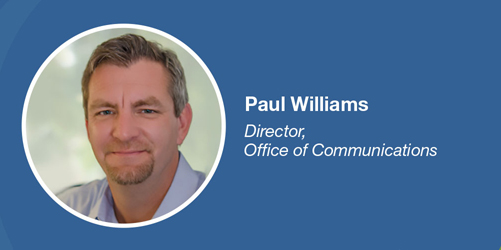 What do you do at NICHD?
What do you do at NICHD?
I am the director of Communications. I oversee a talented group of writers, editors, and public information specialists who develop content for several audiences, including the news media, professional societies, parents and caregivers, and the public at-large. The overall goal of our communications is to promote NICHD’s research initiatives and results and to ensure that our audiences understand how we are using taxpayer funds to help improve the health and wellbeing of women, children, and people with disabilities.
What types of training, experiences, or traits are essential for success in your position?
I have a degree in journalism, which teaches you how to communicate complex ideas in a very small space, but I would imagine that a degree in English or communications could also equip you with the basic skillset needed for the job.
In terms of experience, what worked for me is never turning a task down, no matter how rudimentary it may have felt at the time. Each assignment is an opportunity to learn, and you can advance farther in your career if you understand the process and have a can-do attitude. I started out as an editorial assistant at a magazine, which meant that I answered phones, got coffee for others, and pretty much did what I was told. I didn’t love it, but I knew it was a launching pad to better things, and as soon as I was given a writing assignment, I made sure I hit it out of the park. Within a year, I advanced to associate editor and was placed in charge of a column and a major section of the magazine.
As for traits, you need creativity, flexibility, and a great deal of patience. You also have to be strategic and decisive. Managing up and down is important, so you need to be good at conveying ideas, proposals, and assignments clearly.
What do you find most valuable about working at NICHD?
The NICHD mission is quite unique, compared to other NIH institutes. We have a broad focus that, depending on who you talk to, is either a help or a hindrance. Personally, I love the broad mission because the scientific manuscripts that cross my desk are so diverse and cover so many different things that it never becomes stale. I am always learning new things, which I think is healthy for one’s career. Additionally, I work with some of nicest, most dedicated professionals at NIH. Despite our varying backgrounds, there is a mutual respect and acknowledgement that everyone serves a valuable role in helping NICHD be successful. This professionalism helps the work get done more efficiently.
Return to Get to Know NICHD.
 BACK TO TOP
BACK TO TOP